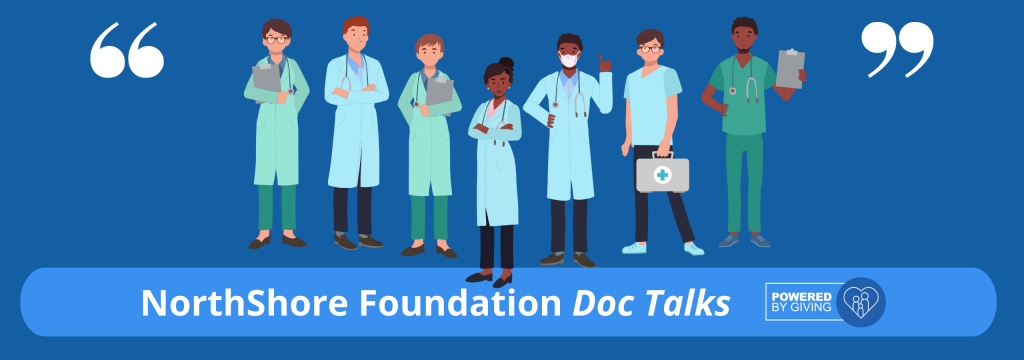Welcome to the NorthShore Hospitals Foundation’s Doc Talks—a series of conversations between some of our best and brightest physicians discussing innovations and advancements that help everyone in our communities be their best.
This edition of Doc Talks features a conversation about sports medicine and orthopaedics with Jason L. Koh, MD, MBA, Director of the Endeavor Health Orthopaedic & Spine Institute, the Mark R. Neaman Family Chair of Orthopaedic Surgery, and Chief Medical Officer of the Chicago Fire FC; and Asheesh Bedi, MD, an orthopaedic surgeon and Director of Sports Medicine and Joint Preservation at the Endeavor Health Orthopaedic & Spine Institute and Team Physician for the Chicago Bears.
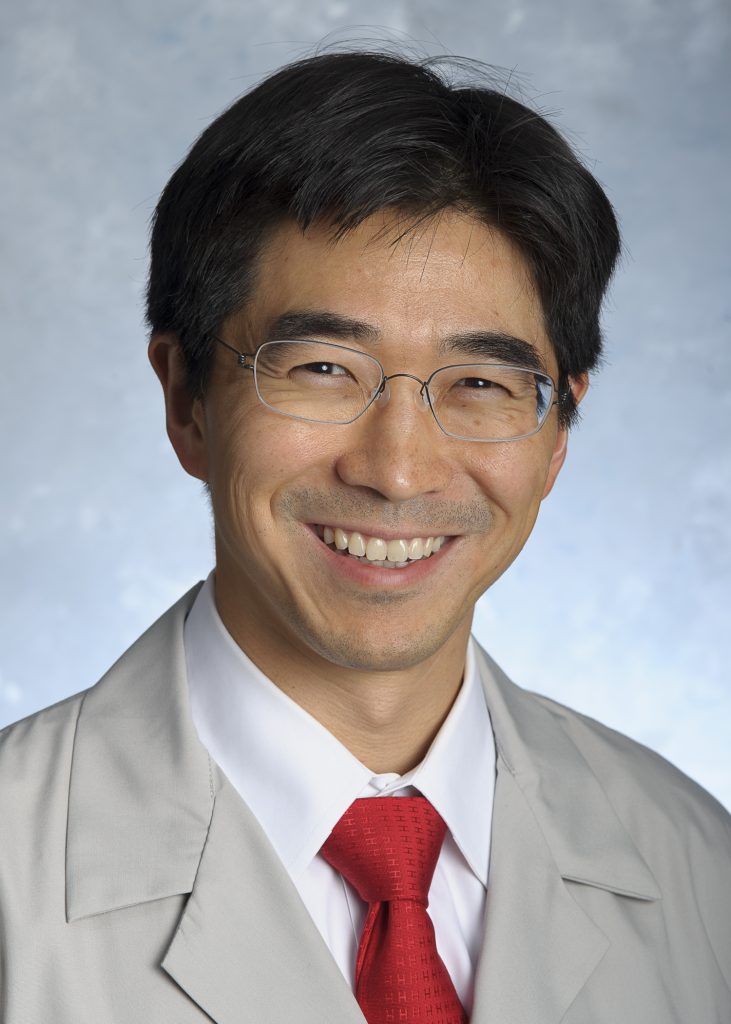
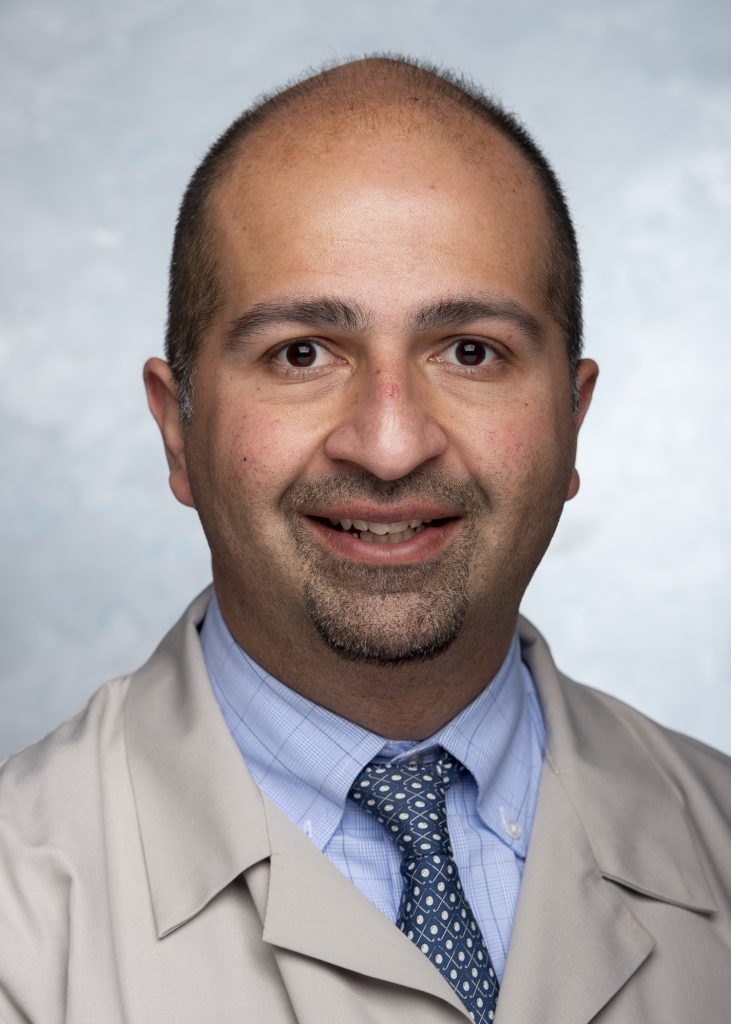
Innovations in orthopaedics
Dr. Koh: As Chair of the Department of Orthopaedic Surgery and Director of the Orthopaedic & Spine Institute, I’m excited about care of the whole patient. We’ve optimized aspects of patient recovery and surgical outcomes. For example, we’re looking at nutritional supplementation to improve patient outcomes in spinal surgeries. Patients take supplements before surgery, much like an athlete does before a marathon, and it helps strengthen their systems. There’s a lot of data available on those patients through Epic (our electronic health record system), and we can provide better outcomes for those patients. Dr. Bedi, what are you seeing as an exciting innovation?
Dr. Bedi: I share your excitement for the innovation we’re seeing in the Orthopaedic & Spine Institute, especially in sports medicine. We’re at the intersection of patient care and innovation. By focusing on a single specialty in musculoskeletal health and combining that with our industry-leading expertise, we’ve been able to push the boundaries in both arthroscopic and open surgery. But innovation must be fueled by discovery. Dr. Koh, what are some research innovations you’ve observed?
Dr. Koh: Well, one innovation in research I’m excited about is minimally invasive techniques for tissue repair. You’re also conducting research in this area, Dr. Bedi, and this is based on basic science research I was involved in 20 years ago! We found that using citric acid, like in citrus fruit, we were able to make a polymer as an implant material. The advantage with this is that bodies absorb the materials and break them down more easily, resulting in better repair.
Dr. Bedi: Wow, that’s impressive!
Dr. Koh: It really is. So what are some research developments you’re seeing as advancing our field?
Dr. Bedi: We’re in a unique and fun era of personalized medicine, if you think about it. Personalized medicine is patient-specific, and the orthopaedic field is ripe for that. We’ve recently done some genome-wide association studies looking at ACL injuries in the knee to identify novel genetic markers that may indicate higher risk of tear. We may also identify some therapeutic targets to improve healing after surgical repair. We would propose doing the same to look at common foot and ankle injuries, like recurrent ankle sprains, stress fractures and navicular fractures. These can end careers for athletes, and genetic factors that may predispose to injury or be targeted with healing could be incredible discoveries in these areas.
Dr. Koh: That’s really important to help athletes and everyday patients alike.
Dr. Bedi: It is! In many ways, we’re leading the way for patient-specific surgery. Our Biomechanics Lab helps us evaluate the outcomes and range of motion if they’ve improved. Research in sports medicine has offered us the opportunity to think about the problems affecting top athletes that really test our procedures. If we achieve positive outcomes for them, it can then benefit everyone.
Working with professional athletes
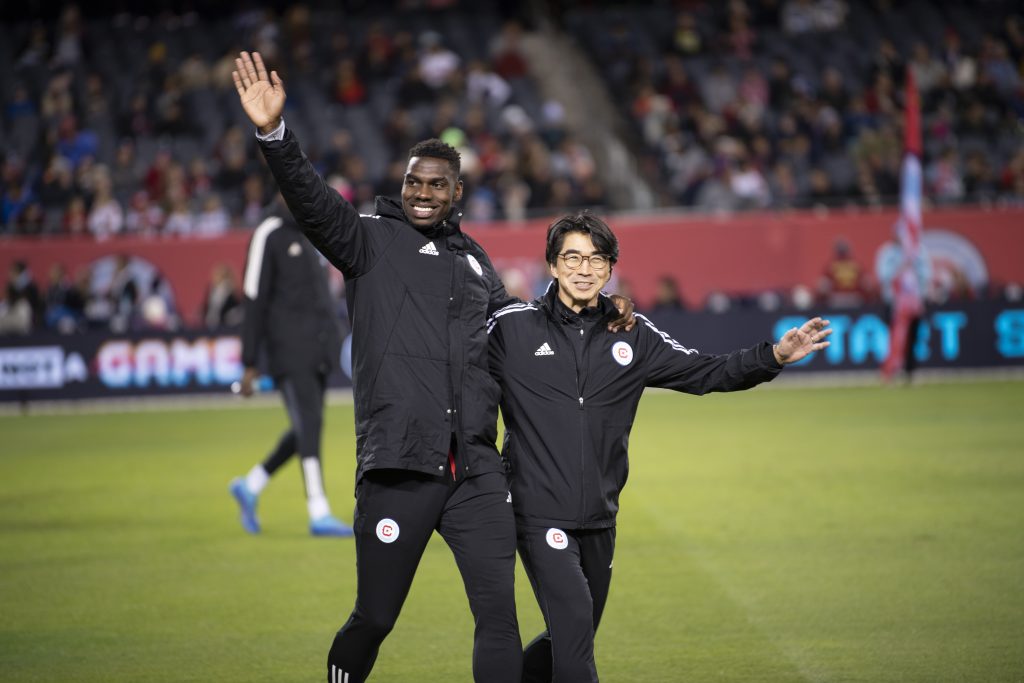
Dr. Koh: It’s truly amazing to take care of such talented individuals on the Chicago Fire soccer team. They’re performing at the peak of their professions and are role models for people who want to play sports. For me, it’s an honor to be entrusted with the care of these talented athletes. They could get their care from anyone in the world, but they chose us. What’s your experience working with professional athletes, Dr. Bedi?
Dr. Bedi: It’s an incredible privilege to care for professional athletes, like the Chicago Bears team players. They’re the best at what they do, and their providers have high expectations that they continue to do so. It tests our own skills and keeps us humble—it allows us to be at the top of our game, too!
Dr. Koh: You’re certainly right about that. In addition to our relationships with the Chicago Bears and Chicago Fire, we recently started working with the National Basketball Retired Players Association, providing care to all their members and their families. It’s a huge compliment to be asked to care for these top athletes.
Dr. Bedi: This speaks to the caliber of what we’re doing not just for those athletes, but for all our patients. We deliver that same level of care for every patient every day. Sports medicine is not just for the care of top athletes. All the issues that affect athletes on the field affect the everyday person, too.
Dr. Koh: That’s a very interesting point you’ve made, Dr. Bedi. The injuries that afflict professional athletes and how they recover can inform how we care for our day-to-day patients. We can bring that same level of attention to detail and care of professional athletes to everyone who walks into our clinics.
Patient experience at the Orthopaedic & Spine Institute
Dr. Koh: The most important thing is understanding that patients are nervous. This is something new for them, and it can be an intimidating experience. But Endeavor Health Skokie Hospital is dedicated to orthopaedic and spine care and is designed to provide an exceptional patient experience. We hear that patients are reassured by that, and our staff is incredibly caring and confident in what they do.
Dr. Bedi: I definitely agree with you, Dr. Koh, that it’s important to approach the experience from the patient’s perspective.
Dr. Koh: Exactly. Patients can feel the difference in our care when they walk in the door and are greeted. They love the physical design of the hospital. It’s welcoming and conveys that it’s a special place dedicated to the care of orthopaedic patients. Our physicians work in state-of-the-art operating rooms with the most advanced diagnostic and surgical innovations—cutting-edge treatment planning, stem cell therapy, robotic surgery and other precision techniques—to help patients achieve their recovery goals. What are you hearing or observing from our patients, Dr. Bedi?
Dr. Bedi: We know that often a patient in need seeks healthcare in times of injury and concern, and finding a compassionate, responsive physician is important. We’re unique at the Orthopaedic & Spine Institute because we’re recruiting physicians who are exceptional in what they do but also believe in the same things we do. Because we’re all working in the same space, our teams are highly collaborative. We communicate with other colleagues if a patient needs additional therapies, for example. We care for our patients the way they would want their families cared for.
Education mission at the Orthopaedic & Spine Institute
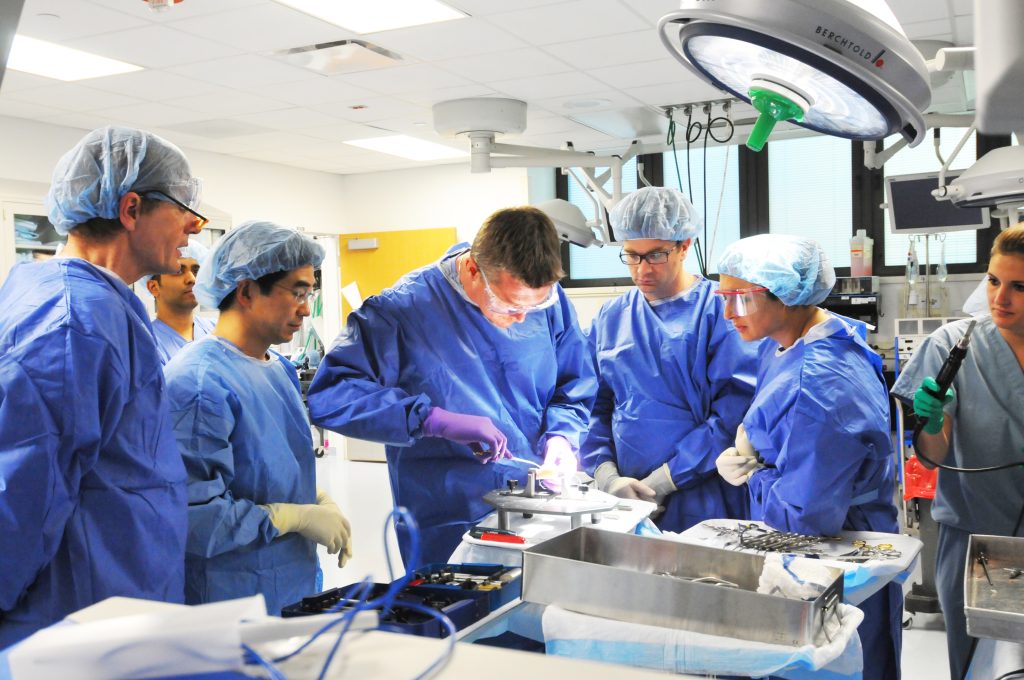
Dr. Bedi: I feel privileged and fortunate to work at the Orthopaedic & Spine Institute, where we have an incredible facility and providers dedicated to one specialty. But we’re also united by a tripartite mission that focuses on patient care, research and education. We’re one of the highest volume orthopaedic hospitals in our state, which gives us volume and data. Data gives you the ingredients to find answers to questions we don’t have answers to.
It helps us attract talent from fellows, residents and medical students, who get top-notch training. We’re a hybrid of an academic medical center with the mission to education, but we’re nimble enough for patient access in real time. What’s your opinion on this, Dr. Koh?
Dr. Koh: I agree with you, Dr. Bedi. The Orthopaedic & Spine Institute allows people to become experts and attracts experts. We have wonderful teams—nursing staff, circulators, surgical techs—and we couldn’t function without them. In fact, we’re the largest provider of orthopaedic care in Illinois with 11,000 cases a year. Because we have such high patient volume, we’re always looking for improvements and are in continuous improvement mode—like Toyota Motors! As a result, our outcomes are some of the best in the country.
Role of philanthropy in supporting the Institute’s mission
Dr. Bedi: Philanthropy is so critical and of paramount importance in healthcare and musculoskeletal care. Advancing innovation and research while supporting a clinical enterprise is challenging. We’re seeing that many institutions that traditionally funded research, like the National Institutes for Health (NIH), are scaling back.
Philanthropy gives us the spark of discovery to apply for bigger grants and awards. An initial investment helps us build momentum and is fundamentally critical for missions to come. How do you see philanthropy as helping our institutional mission, Dr. Koh?
Dr. Koh: I agree with you that philanthropy is critically important. For example, musculoskeletal disease is a leading cause of disease in adults today, yet the NIH budget is only 1.7% for musculoskeletal research. We need private philanthropy to identify new and better ways to help our patients. The regenerative and personalized medicine advancements and therapies we’ve developed would not be possible without donor support.
Dr. Bedi: It’s extremely impressive when you think about how much impact philanthropy has on research, even though it can take years to come to fruition.
Dr. Koh: Yes, that is very true. But philanthropy allows us to ask how to make things better for our patients. It helps our patients and their families have a great experience in our Institute. Philanthropy allows us to fill in those gaps and invest in newer technologies and in research and education. Thanks to that support, we can develop new techniques that bring amazing outcomes for patients—they can play sports again, walk again or even pick up their grandchild.
The efforts and innovations described here would not be possible without philanthropic support. We are powered by the generosity of donors who directly impact our hospitals’ ability to deliver on our commitment to community-connected care.

